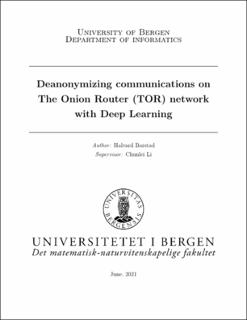Deanonymizing communications on The Onion Router (TOR) network with Deep Learning
Master thesis
Permanent lenke
https://hdl.handle.net/11250/2759639Utgivelsesdato
2021-06-01Metadata
Vis full innførselSamlinger
- Master theses [197]
Sammendrag
Staying anonymous on the Internet is becoming increasingly difficult. Advertisements for services that to some extent offer privacy are frequent, and the general population seems to be more aware of privacy than previously. The National Security Agency documents leaked by Edward Snowden, revealed how the United States performed mass surveillance and described how it was close to impossible not to be digitally monitored by powerful governments. However, there was one specific type of technology that the NSA themselves internally acknowledged made surveillance hard. This type of technology is called onion routing, and the most popular software for this is The Onion Router, usually referred to as Tor. Onion routing works by sending packets through a chain of multiple nodes before it reaches its destination. Because of this, a node will only know the previous and the next node in the chain, making it impossible to know both who sent it, and where it is headed at the same time. For a good amount of years this has been considered the most secure way of staying anonymous, but with increasingly powerful computers, deep neural networks have become extremely effective at conducting multiple tasks. This thesis will explore how deep neural networks can be utilized to create digital fingerprints of websites, and then use these fingerprints to possibly identify which page a user is trying to access through Tor.
